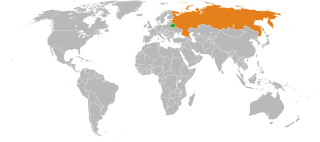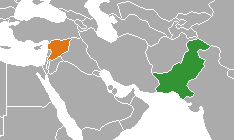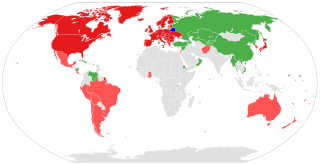Belarus | Syria |
|---|---|
Belarus and the Syrian Arab Republic established diplomatic relations in 1992. Belarus has an embassy in Damascus, [1] and Syria has an embassy in Minsk.
Belarus | Syria |
|---|---|
Belarus and the Syrian Arab Republic established diplomatic relations in 1992. Belarus has an embassy in Damascus, [1] and Syria has an embassy in Minsk.
In 2007, Syria was one of 33 countries to vote against a United Nations General Assembly resolution titled "Situation of human rights in Belarus". [2]
In 2023, Belarus was among ten countries to join Syria in voting against a resolution that would establish an independent body to determine what happened to more than 130,000 people missing as a result of the conflict in Syria. [3]
On July 10, 2010, Syrian President Bashar al-Assad visited Minsk. [4] Assad has supported President Alexander Lukashenko, and Lukashenko has supported Assad in the Syrian Civil War
In 2014, Syria and Belarus were among 11 countries to vote against United Nations General Assembly Resolution 68/262 which would recognize Crimea as the territorial integrity of Ukraine. [5]
Both Belarus and Syria support the Russian invasion of Ukraine. [6]

Belarus, officially the Republic of Belarus, is a landlocked country in Eastern Europe. It is bordered by Russia to the east and northeast, Ukraine to the south, Poland to the west, and Lithuania and Latvia to the northwest. Covering an area of 207,600 square kilometres (80,200 sq mi) and with a population of 9.2 million, Belarus is the 13th-largest and the 20th-most populous country in Europe. The country has a hemiboreal climate and is administratively divided into six regions. Minsk is the capital and largest city; it is administered separately as a city with special status.

Bashar al-Assad is a Syrian politician who is the current and 19th president of Syria since 17 July 2000. In addition, he is the commander-in-chief of the Syrian Armed Forces and the secretary-general of the Central Command of the Arab Socialist Ba'ath Party, which nominally espouses a neo-Ba'athist ideology. His father and predecessor was General Hafez al-Assad, whose presidency between 1971 and 2000 marked the transfiguration of Syria from a republican state into a dynastic dictatorship tightly controlled by an Alawite-dominated elite composed of the armed forces and the Mukhabarat, who are loyal to the al-Assad family.

Belarus and Russia share a land border and constitute the supranational Union State. Several treaties have been concluded between the two nations bilaterally. Russia is Belarus' largest and most important economic and political partner. Both are members of various international organizations, including the Commonwealth of Independent States, the Eurasian Economic Union, the Collective Security Treaty Organization, and the United Nations.

Diplomatic relations between the Argentine Republic and Ukraine, have existed for decades. The importance of relations centers on the history of Ukrainian migration to Argentina. Ukrainians in Argentina form the second largest Ukrainian community in Latin America numbering approximately 250,000 Ukrainians and their descendants. Both nations are members of the World Trade Organization.

Pakistan–Syria relations are the historic, international, and bilateral relations between Syria and Pakistan. Syria has an embassy in Islamabad. Pakistan is represented in Syria through its embassy in Damascus. Through the ancient civilization exchange, areas of modern Pakistan were part of the silk route with the Syria and for centuries, Syrian Islamic missionaries that introduced Islam in the parts of now integrated in Pakistan after 711 AD were from Syria.

Belarus and Ukraine are both are full members of the Baku Initiative and Central European Initiative. In 2020, during the Belarusian protests against president Lukashenko, the relationship between Ukraine and Belarus began to deteriorate, after the Ukrainian government criticized Belarusian president Alexander Lukashenko. In the waning days of 2021, the relationship between both countries rapidly deteriorated, culminating in a full-scale invasion on 24 February 2022. Belarus has allowed the stationing of Russian troops and equipment in its territory and its use as a springboard for offensives into northern Ukraine but has denied the presence of Belarusian troops in Ukraine. Even though part of the Russian invasion was launched from Belarus, Ukraine did not break off diplomatic relations with Belarus, but remain frozen.

United Nations General Assembly Resolution 62/243, titled "The Situation in the Occupied Territories of Azerbaijan", is a resolution of the United Nations General Assembly about the situation in Nagorno-Karabakh, which was adopted on March 14, 2008 at the 62nd session of the General Assembly. It became the seventh United Nations document concerning Nagorno-Karabakh and the third and last United Nations General Assembly document on it.

The Belarusian opposition consists of groups and individuals in Belarus seeking to challenge, from 1988 to 1991, the authorities of Soviet Belarus, and since 1995, the leader of the country Alexander Lukashenko, whom supporters of the movement often consider to be a dictator. Supporters of the movement tend to call for a parliamentary democracy based on a Western model, with freedom of speech and political and religious pluralism.

International reactions to the annexation of Crimea by the Russian Federation have largely been condemnatory of Russia's actions, supportive of Ukraine's sovereignty and territorial integrity, and supportive of finding a quick end to the crisis. The United States and the European Union responded by enacting sanctions against Russia for its role in the crisis, and urged Russia to withdraw. Russia has accused the United States and the EU of funding and directing the revolution and retaliated to the sanctions by imposing its own.

United Nations General Assembly Resolution 68/262 was adopted on 27 March 2014 by the sixty-eighth session of the United Nations General Assembly in response to the Russian annexation of Crimea and entitled "territorial integrity of Ukraine". The nonbinding resolution, which was supported by 100 United Nations member states, affirmed the General Assembly's commitment to the territorial integrity of Ukraine within its internationally recognized borders and underscored the invalidity of the 2014 Crimean referendum. Eleven nations voted against the resolution, while 58 abstained, and a further 24 states were absent when the vote took place.

Iran–Ukraine relations are the bilateral relations between Iran and Ukraine. Iran has an embassy in Kyiv and Ukraine has an embassy in Tehran. Prior to 2020, the relationship between the Islamic Republic of Iran and Ukraine was friendly but has since sharply deteriorated due to Iran supplying its Shahed military drones to Russia during the 2022 Russian invasion of Ukraine as well as the downing of Ukraine International Airlines Flight 752 by Iran's Islamic Revolutionary Guard Corps in 2020.

The following is a list of the official reactions to the 2020 Belarusian presidential election and the surrounding 2020 Belarusian protests.

Presidential elections were held in Syria on 26 May 2021, with expatriates able to vote in some embassies abroad on 20 May. The three candidates were incumbent president Bashar al-Assad, Mahmoud Ahmad Marei and Abdullah Sallum Abdullah. The elections were considered not to be free and fair. The United Nations condemned the elections as an illegitimate process with "no mandate"; accusing the Ba'athist regime of undermining UN Resolution 2254 and for obstructing the UN-backed political solution that calls for a "free and fair elections" under international monitoring.

Belarus, a close ally of Russia, has supported its eastern neighbour in the Russian invasion of Ukraine. Before the start of the offensive, Belarus allowed the Russian Armed Forces to perform weeks-long military drills on its territory; however, the Russian troops did not exit the country after they were supposed to finish. Belarus allowed Russia to stage part of the invasion from its territory, giving Russia the shortest possible land route to Ukraine's capital, Kyiv. However, these forces withdrew within two months, thus ceasing land-based military operations originating from Belarus and resulting in the recapture of the Ukrainian side of the border region by Ukraine. Despite this, the situation along the border remains tense, with Ukraine closing the border checkpoints leading into Belarus, bar special cases.

The eleventh emergency special session of the United Nations General Assembly opened on 28 February 2022 at the United Nations headquarters. It addresses the Russian invasion of Ukraine. Maldivian politician Abdulla Shahid served as President of the body during this time.

United Nations Security Council Resolution 2623 called for the eleventh emergency special session of the United Nations General Assembly on the subject of the 2022 Russian invasion of Ukraine. Albania and the United States introduced the resolution before the United Nations Security Council, which adopted it on 27 February 2022. Russia voted against while China, India and the United Arab Emirates abstained. As this was a procedural resolution, no permanent member could exercise their veto power.

Eritrea and Russia relations are diplomatic relations between the State of Eritrea and the Russian Federation. Russia has an embassy in Asmara and Eritrea has its own in Moscow.
The Russian invasion of Ukraine violated international law. The invasion has also been called a crime of aggression under international criminal law and under some countries' domestic criminal codes – including those of Ukraine and Russia – although procedural obstacles exist to prosecutions under these laws.
Burundi–Russia relations are the relations between the two countries, Burundi and Russia. Both countries established diplomatic relations on 1 October 1962 Russia has an embassy in Bujumbura. Burundi has an embassy in Moscow. Relations improved when Burundian relations with the west deteriorated. In recent years, Russia and Burundi consistently remains similar visions and collaboration in international arena, including UN framework. Russia considers Burundi one of its trusted allies on the African continent.
Belarus and Sudan established diplomatic relations on 15 July 1999.
{{cite journal}}: Cite journal requires |journal= (help)